国际海事公约
- 格式:pptx
- 大小:793.00 KB
- 文档页数:20
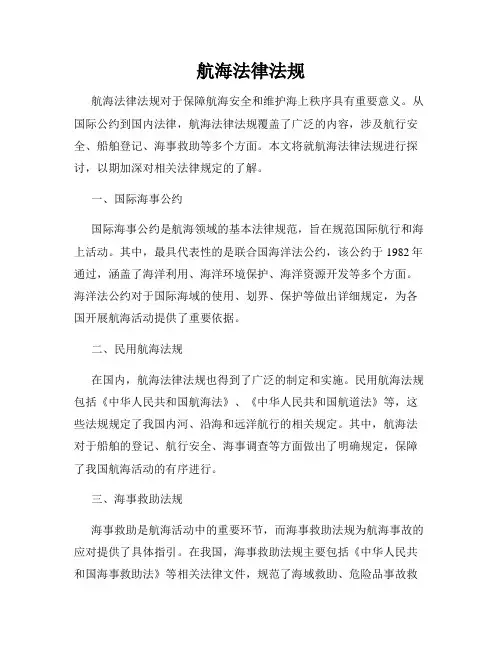
航海法律法规航海法律法规对于保障航海安全和维护海上秩序具有重要意义。
从国际公约到国内法律,航海法律法规覆盖了广泛的内容,涉及航行安全、船舶登记、海事救助等多个方面。
本文将就航海法律法规进行探讨,以期加深对相关法律规定的了解。
一、国际海事公约国际海事公约是航海领域的基本法律规范,旨在规范国际航行和海上活动。
其中,最具代表性的是联合国海洋法公约,该公约于1982年通过,涵盖了海洋利用、海洋环境保护、海洋资源开发等多个方面。
海洋法公约对于国际海域的使用、划界、保护等做出详细规定,为各国开展航海活动提供了重要依据。
二、民用航海法规在国内,航海法律法规也得到了广泛的制定和实施。
民用航海法规包括《中华人民共和国航海法》、《中华人民共和国航道法》等,这些法规规定了我国内河、沿海和远洋航行的相关规定。
其中,航海法对于船舶的登记、航行安全、海事调查等方面做出了明确规定,保障了我国航海活动的有序进行。
三、海事救助法规海事救助是航海活动中的重要环节,而海事救助法规为航海事故的应对提供了具体指引。
在我国,海事救助法规主要包括《中华人民共和国海事救助法》等相关法律文件,规范了海域救助、危险品事故救助等方面的内容。
海事救助法规的实施,有效保障了航海安全和人员生命财产的安全。
四、航行安全管理法规航行安全一直是航海活动中的重中之重,而航行安全管理法规则是维护海上秩序的重要法律保障。
《中华人民共和国海洋环境保护法》、《中华人民共和国海洋石油勘探开发法》等法规,对于海上环境的保护和海域资源的开发做出了具体规定,维护了海洋生态平衡。
综上所述,航海法律法规涉及的领域广泛,相关法规的制定和实施对于维护航海秩序和保障船舶安全至关重要。
未来,在全球化背景下,各国应加强合作,共同遵守相关法规,促进全球航海事业的有序发展。
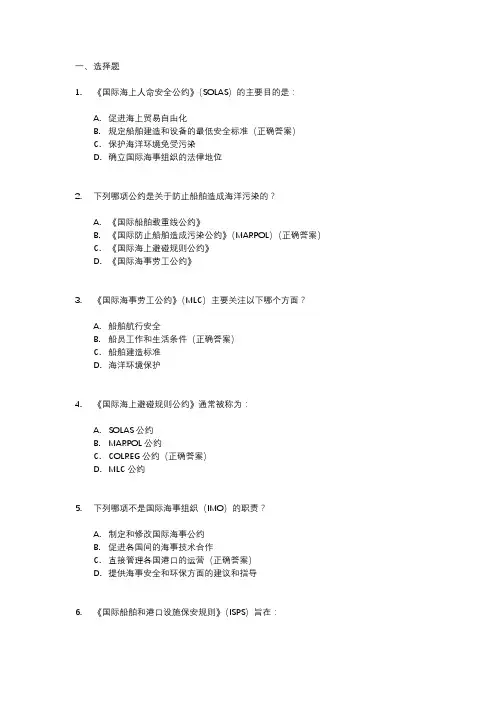
一、选择题
1.《国际海上人命安全公约》(SOLAS)的主要目的是:
A.促进海上贸易自由化
B.规定船舶建造和设备的最低安全标准(正确答案)
C.保护海洋环境免受污染
D.确立国际海事组织的法律地位
2.下列哪项公约是关于防止船舶造成海洋污染的?
A.《国际船舶载重线公约》
B.《国际防止船舶造成污染公约》(MARPOL)(正确答案)
C.《国际海上避碰规则公约》
D.《国际海事劳工公约》
3.《国际海事劳工公约》(MLC)主要关注以下哪个方面?
A.船舶航行安全
B.船员工作和生活条件(正确答案)
C.船舶建造标准
D.海洋环境保护
4.《国际海上避碰规则公约》通常被称为:
A.SOLAS公约
B.MARPOL公约
C.COLREG公约(正确答案)
D.MLC公约
5.下列哪项不是国际海事组织(IMO)的职责?
A.制定和修改国际海事公约
B.促进各国间的海事技术合作
C.直接管理各国港口的运营(正确答案)
D.提供海事安全和环保方面的建议和指导
6.《国际船舶和港口设施保安规则》(ISPS)旨在:
A.提高船舶航行速度
B.确保船舶和港口设施的安全和保安(正确答案)
C.规范船舶建造材料的使用
D.促进国际海事贸易的发展
7.下列哪项公约是关于船舶吨位丈量和载重线标准的?
A.《国际船舶载重线公约》(正确答案)
B.《国际防止船舶造成污染公约》
C.《国际海事劳工公约》
D.《国际海上避碰规则公约》
8.国际海事组织(IMO)的最高权力机构是:
A.理事会
B.海事安全委员会
C.大会(正确答案)
D.环境保护委员会。
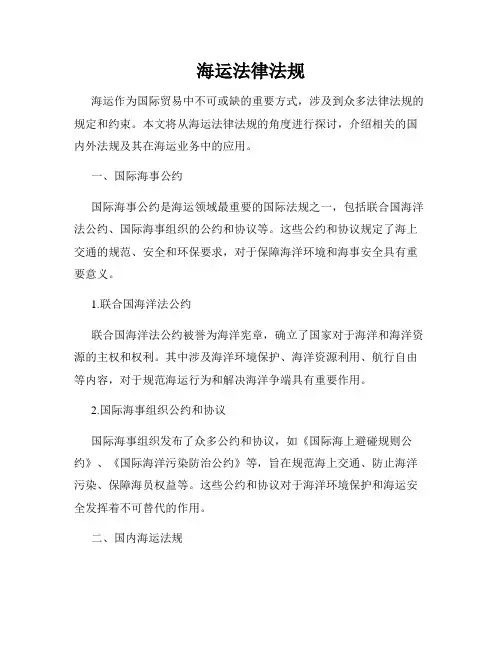
海运法律法规海运作为国际贸易中不可或缺的重要方式,涉及到众多法律法规的规定和约束。
本文将从海运法律法规的角度进行探讨,介绍相关的国内外法规及其在海运业务中的应用。
一、国际海事公约国际海事公约是海运领域最重要的国际法规之一,包括联合国海洋法公约、国际海事组织的公约和协议等。
这些公约和协议规定了海上交通的规范、安全和环保要求,对于保障海洋环境和海事安全具有重要意义。
1.联合国海洋法公约联合国海洋法公约被誉为海洋宪章,确立了国家对于海洋和海洋资源的主权和权利。
其中涉及海洋环境保护、海洋资源利用、航行自由等内容,对于规范海运行为和解决海洋争端具有重要作用。
2.国际海事组织公约和协议国际海事组织发布了众多公约和协议,如《国际海上避碰规则公约》、《国际海洋污染防治公约》等,旨在规范海上交通、防止海洋污染、保障海员权益等。
这些公约和协议对于海洋环境保护和海运安全发挥着不可替代的作用。
二、国内海运法规在国内,海运行业也受到一系列法律法规的约束和管理。
从国家层面到地方层面,各级法规相互配合,形成了完整的海运法规体系。
1.《中华人民共和国海商法》《中华人民共和国海商法》是中国海运领域的基本法律法规,规定了海商行为的法律地位、权利义务、违约责任等内容。
它的出台为海运市场的健康发展提供了法律保障。
2.《关于海域使用管理的若干规定》《关于海域使用管理的若干规定》是我国地方性法规,针对海域使用管理提出了具体的规定和要求。
这些规定为海运企业在海域使用和交通安全管理中提供了指导和规范。
三、海运业务管理规定除了法律法规外,海运业务还需遵守相关的管理规定和标准。
这些规定往往由行业协会或组织发布,旨在规范海运市场秩序、促进行业健康发展。
1.《海运业务管理办法》《海运业务管理办法》是国家交通部门发布的管理规定,主要涉及船舶管理、运输合同、运费结算等方面。
它对于规范海运企业的经营行为和提升服务质量发挥着积极作用。
2.《船舶管理规定》《船舶管理规定》是船舶管理单位和船东组织遵循的管理标准,包括船员配备、船舶维护、安全管理等内容。
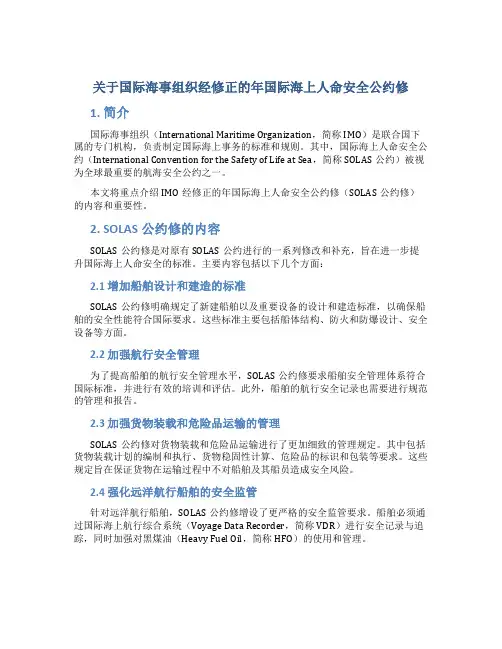
关于国际海事组织经修正的年国际海上人命安全公约修1. 简介国际海事组织(International Maritime Organization,简称IMO)是联合国下属的专门机构,负责制定国际海上事务的标准和规则。
其中,国际海上人命安全公约(International Convention for the Safety of Life at Sea,简称SOLAS公约)被视为全球最重要的航海安全公约之一。
本文将重点介绍IMO经修正的年国际海上人命安全公约修(SOLAS公约修)的内容和重要性。
2. SOLAS公约修的内容SOLAS公约修是对原有SOLAS公约进行的一系列修改和补充,旨在进一步提升国际海上人命安全的标准。
主要内容包括以下几个方面:2.1 增加船舶设计和建造的标准SOLAS公约修明确规定了新建船舶以及重要设备的设计和建造标准,以确保船舶的安全性能符合国际要求。
这些标准主要包括船体结构、防火和防爆设计、安全设备等方面。
2.2 加强航行安全管理为了提高船舶的航行安全管理水平,SOLAS公约修要求船舶安全管理体系符合国际标准,并进行有效的培训和评估。
此外,船舶的航行安全记录也需要进行规范的管理和报告。
2.3 加强货物装载和危险品运输的管理SOLAS公约修对货物装载和危险品运输进行了更加细致的管理规定。
其中包括货物装载计划的编制和执行、货物稳固性计算、危险品的标识和包装等要求。
这些规定旨在保证货物在运输过程中不对船舶及其船员造成安全风险。
2.4 强化远洋航行船舶的安全监管针对远洋航行船舶,SOLAS公约修增设了更严格的安全监管要求。
船舶必须通过国际海上航行综合系统(Voyage Data Recorder,简称VDR)进行安全记录与追踪,同时加强对黑煤油(Heavy Fuel Oil,简称HFO)的使用和管理。
3. SOLAS公约修的重要性SOLAS公约修的修订是为了应对海上人命安全面临的新挑战和风险,使公约更加符合现实需求。
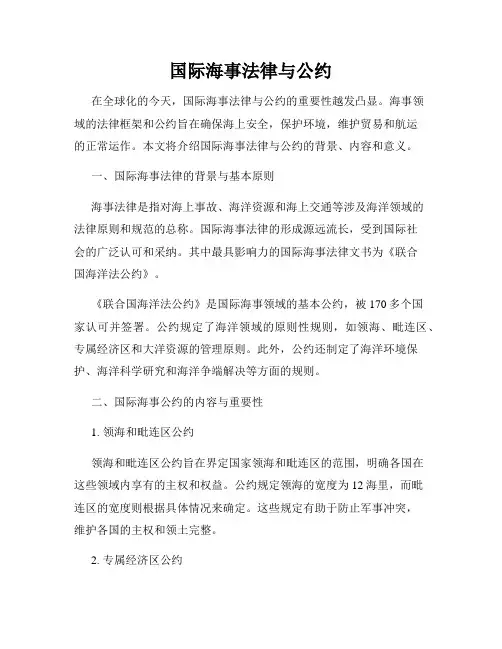
国际海事法律与公约在全球化的今天,国际海事法律与公约的重要性越发凸显。
海事领域的法律框架和公约旨在确保海上安全,保护环境,维护贸易和航运的正常运作。
本文将介绍国际海事法律与公约的背景、内容和意义。
一、国际海事法律的背景与基本原则海事法律是指对海上事故、海洋资源和海上交通等涉及海洋领域的法律原则和规范的总称。
国际海事法律的形成源远流长,受到国际社会的广泛认可和采纳。
其中最具影响力的国际海事法律文书为《联合国海洋法公约》。
《联合国海洋法公约》是国际海事领域的基本公约,被170多个国家认可并签署。
公约规定了海洋领域的原则性规则,如领海、毗连区、专属经济区和大洋资源的管理原则。
此外,公约还制定了海洋环境保护、海洋科学研究和海洋争端解决等方面的规则。
二、国际海事公约的内容与重要性1. 领海和毗连区公约领海和毗连区公约旨在界定国家领海和毗连区的范围,明确各国在这些领域内享有的主权和权益。
公约规定领海的宽度为12海里,而毗连区的宽度则根据具体情况来确定。
这些规定有助于防止军事冲突,维护各国的主权和领土完整。
2. 专属经济区公约专属经济区公约规定各国在其领海外200海里范围内有权开展经济活动,并享有开发和管理该区域内的资源的权利。
这一公约的制定有利于促进海洋资源的可持续开发,确保各国间的资源分配公平合理。
3. 国际海上通信公约国际海上通信公约旨在规范和促进国际海上通信的安全和效率。
该公约规定了通信设备的标准和规范,确保各国之间的通信畅通无阻,实现海上通信的便利和安全。
4. 国际海上航行公约国际海上航行公约确立了全球海上航行的准则和规范,保障了海上交通的安全和顺畅。
公约规定了航行自由原则,明确船舶在航行中的义务和责任,并规定了船舶的标志、通行程序和避让原则等重要内容。
海事公约的内容丰富多样,涵盖了海上交通、海洋资源开发、环境保护和争端解决等方面。
这些公约的制定和执行对于维护国际航运秩序,保障安全环境,确保海洋生态的健康发展具有重要意义。

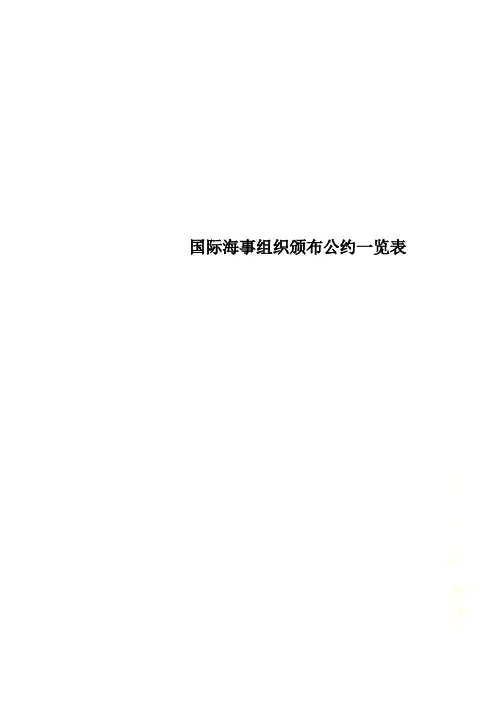
国际海事组织颁布公约一览表国际海事组织颁布公约一览表1、1974年国际海上人命安全公约(Internation Convention for the Safety of Life at Sea, 1974, 修正于1974年(SOLAS)) 1980年5月25日2、1974年国际海上人命安全公约1978年议定书(SOLAS PROT (amended) 1978)1981年5月1日3、1974年国际海上人命安全公约1988年议定书(SOLAS PROT ( (HSSC) 1988)2002年02月03日4、1972年国际海上避碰规则公约(Convention on the International Regulations for Preventing Collisions at Sea, 1972, as amended (COLREGS (amended) 1972)5、1973年国际防止船舶污染公约(International Convention for the Prevention of Pollution from Ships, 1973 as modified by the Protocol of 1978 thereto (MARPOL (amended) 71/78))1983年10月2日6、1965年国际便利海上运输公约(Convention on Facilitation of International Maritime Traffic, 1965, as amended (FAL (amended) 1965))1967年3月5日7、1966年国际载重线公约(International Convention on Load Lines, 1966 (LL 1966))1968年7月21日8、1966年国际载重线公约1988年议定书(LL PROT (HSSC) 1988)2005年01月01日9、1969年国际船舶吨位丈量公约(International Convention on Tonnage Measurement of Ships, 1969 (TONNAGE 1969))1982年7月18日10、1969年国际干预公海油污事件公约(International Convention relating to Intervention on the High Seas in Cases of Oil Pollution Casualties, 1969 (INTERVENTION 1969))1975年5月6日11、1973年国际干预公海非油污类物质污染议定书(Protocol relating to Intervention on the High Seas in Cases of Pollution by substances other than Oil, 1973, as amended (INTERVENTION PROT (amended) 1973 ) 1983年3月30日12、1969年国际油污损害民事责任公约(International Convention on Civil Liability for Oil Pollution Damage, 1969 (CLC 1969))1975年6月19日13、1969年国际油污损害民事责任公约1976年议定书(CLC PROT 1976)1981年4月8日14、1969年国际油污损害民事责任公约1992年议定书(CLC PORT 1992)1996年5月30日15、1971年特种业务客船协定(Special Trade Passenger Ships Agreement, 1971 (STP 1971))1974年1月2日16、1973年特种业务客船舱室要求议定书(Protocol on Space Requirements for Special Trade Passenger Ships, 1973 (SPACESTP 1973))1977年6月2日17、1971年核材料运输民事责任公约(Convention relating to Civil Liability in the Field of Maritime Carriage of Nuclear Material, 1971 (NUCLEAR 1971))1975年7月15日18、1971年关于设立国际油污损害赔偿基金国际公约(International Convention on the Establishment of an International Fund for Compensation for Oil Pollution Damage, 1971 (FUND 1971))1978年10月16日19、1971年关于设立国际油污损害赔偿基金国际公约1976年议定书(FUND PROT 1976)1994年11月22日20、1971年关于设立国际油污损害赔偿基金国际公约1992年议定书(FUND PROT 1992)1996年5月30日21、1972年国际集装箱安全公约(International Convention for Safe Container, 1972, as amended (CSC (amended) 1972))1977年9月6日22、1974年海运旅客及行李雅典公约(Athens Convention relating to the Carriage of Passengers and their Luggage by Sea, 1974 (PAL 1976))1987年4月28日23、1974年海运旅客及行李雅典公约1976年议定书(PALPORT 1976)1989年4月30日24、1974年海运旅客及行李雅典公约1990年议定书(PAL PORT 1990)尚未生效25、国际海事卫星组织公约(Convention on the International Maritime Satellite Organization (INMARSAT), as amended (INMARSAT C (amended)) 1979年7月16日26、国际海事卫星组织业务协定(Operating Agreement on the International Maritime Satellite Organization (INMARSAT), as amended (INMARSAT OA (amended)) 1979年7月16日27、1976年海事索赔责任限制公约(Convention on Limitation of Liability for Maritime Claims, 1976 (LLMC 1976))1986年12月1日28、1976年海事索赔责任限制公约1996年议定书(LLMC PROT 1996)尚未生效29、1977年国际捕鱼船安全Torremolinos公约1993年Torremolinos 议定书(SFV PROT 1993)尚未生效30、1978年海员培训、发证和值班标准国际公约(International Convention on Standards of Training, Certification and Watchkeeping for Seafarers, 1978, as amended (STCW (amended) 1978))1984年4月28日31、1995年捕鱼船职员培训、发证和值班标准国际公约(International Convention on Standards of Training, Certification and Watchkeeping for Fishing Vessel Personnel, 1995(STCW-F))尚未生效32、1979年国际海上搜寻救助公约(International Convention onMaritime Search and Rescue, 1979 (SAR 1979))1985年6月22日33、1988年制止危及海上航行安全非法行为公约(Convention for the suppression of Unlawful Acts against the Safety of Maritime Navigation (SUA 1988))1992年3月1日34、1988年制止危及海上航行安全非法行为公约议定书(SUA PROT 1988)1992年3月1日35、1989年国际救助公约(International Convention on Salvage, 1989 (SALVAGE 1989))1996年7月14日36、1990年国际油污防备、反应和合作公约(International Convention on Oil Pollution Preparedness, Response and Co-operation, 1990 (OPRC 1990))1995年5月13日37、1996年关于与危险品及有毒物品海上运输相关的责任及损害赔偿国际公约(International Convention on Liability and Compensation for Damage in connection with the Carriage of Hazardous and Noxious Substances by Sea, 1996 (HNS 1996))尚未生效38、1993年海上留置权和抵押权国际公约(International Convention on Maritime Liens and Mortgages, 1993, 于UN/IMO 代表大会上通过)尚未生效39、1972年防止倾倒废料及其他物质污染海洋公约(Convention on the Prevention of Marine Pollution by Dumping of Wastes andOther Matter, 1972, as amended (LC (amended) 1972))1975年8月30日。

国际海事组织公约文章属性•【缔约国】国际海事组织•【条约领域】海事•【公布日期】1948.03.06•【条约类别】公约•【签订地点】日内瓦正文国际海事组织公约(1948年3月6日订于日内瓦)第一章本组织宗旨第一条本组织的宗旨为:一、在与从事国际贸易的航运的各种技术问题有关的政府规章和惯例方面,为各国政府提供合作机构;并在与海上安全、航行效率和防止及控制船只对海上污染有关的问题上,鼓励各国普遍采用最高可行的标准;并处理与本条所规定宗旨有关的行政与法律问题。
二、鼓励各国政府取消其对从事国际贸易的航运的歧视行为和不必要的限制,以便在没有歧视的基础上增进航运事业对世界贸易的效用;一国政府为发展本国航运事业并为安全目的而给予航运业的帮助和鼓励,如非基于旨在限制其他国家航运业自由参加国际贸易的措施,并不构成歧视行为;三、将有关航运业所采取的不正当的限制措施问题,根据第二章规定提交本组织研究;四、将联合国的任何机构或专门机构可能委托的有关航运和航运对海洋环境影响的任何问题,提交本组织研究;五、为各国政府交流有关本组织所研究的问题的情报。
第二章职权第二条为达到第一章所列各种目的,现将本组织的职权规定如下:一、对于会员、联合的任何机构或专门机构,或其他政府间的组织向本组织提出的第一条第一、二、三各款内的问题,或第一条第四款内的问题,除适用第三条的规定外,本组织加以研究,并提出意见;二、负责公约、协议或其他文件的起草工作,并向各国政府和政府间的组织推荐这些公约、协议或文件;必要时,并召集会议进行讨论;三、为会员之间进行协商,并为各国政府交流情报提供机构;四、履行与本条第一、二及三款有关的职权,尤其应履行有关海事问题的国际文件所赋予的职权;五、根据需要并按第十章规定,促进本组织宗旨范围内的合作。
第三条对于本组织认为可能通过国际航运业的正常手续处理的问题,本组织将建议按照正常手续处理。
当本组织认为与某些航运业所采取不正当的限制措施有关的任何问题,不可能或者事实已经证明不可能通过国际航运业的正常手续处理,经其中一个会员提出要求,本组织应对此问题加以研究,但须先由有关会员进行直接谈判。
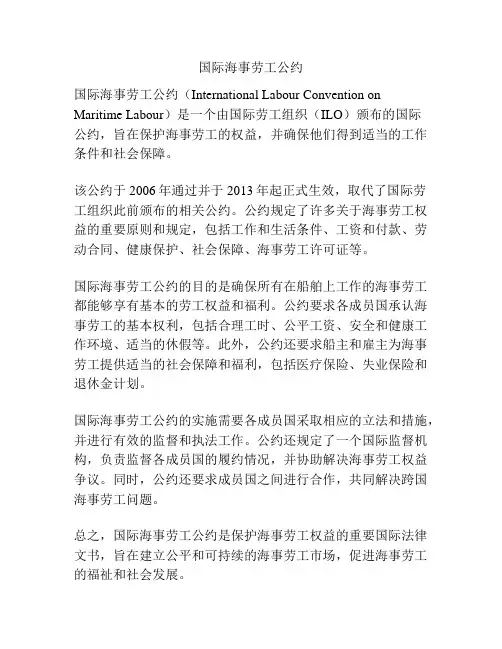
国际海事劳工公约
国际海事劳工公约(International Labour Convention on Maritime Labour)是一个由国际劳工组织(ILO)颁布的国际
公约,旨在保护海事劳工的权益,并确保他们得到适当的工作条件和社会保障。
该公约于2006年通过并于2013年起正式生效,取代了国际劳工组织此前颁布的相关公约。
公约规定了许多关于海事劳工权益的重要原则和规定,包括工作和生活条件、工资和付款、劳动合同、健康保护、社会保障、海事劳工许可证等。
国际海事劳工公约的目的是确保所有在船舶上工作的海事劳工都能够享有基本的劳工权益和福利。
公约要求各成员国承认海事劳工的基本权利,包括合理工时、公平工资、安全和健康工作环境、适当的休假等。
此外,公约还要求船主和雇主为海事劳工提供适当的社会保障和福利,包括医疗保险、失业保险和退休金计划。
国际海事劳工公约的实施需要各成员国采取相应的立法和措施,并进行有效的监督和执法工作。
公约还规定了一个国际监督机构,负责监督各成员国的履约情况,并协助解决海事劳工权益争议。
同时,公约还要求成员国之间进行合作,共同解决跨国海事劳工问题。
总之,国际海事劳工公约是保护海事劳工权益的重要国际法律文书,旨在建立公平和可持续的海事劳工市场,促进海事劳工的福祉和社会发展。
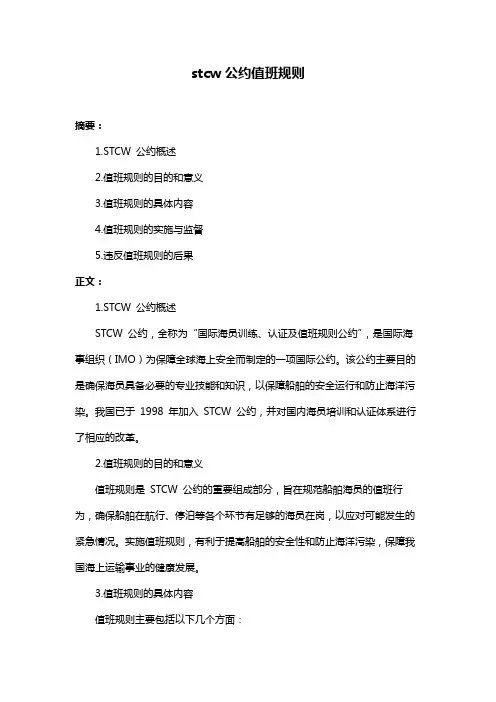
stcw公约值班规则摘要:1.STCW 公约概述2.值班规则的目的和意义3.值班规则的具体内容4.值班规则的实施与监督5.违反值班规则的后果正文:1.STCW 公约概述STCW 公约,全称为“国际海员训练、认证及值班规则公约”,是国际海事组织(IMO)为保障全球海上安全而制定的一项国际公约。
该公约主要目的是确保海员具备必要的专业技能和知识,以保障船舶的安全运行和防止海洋污染。
我国已于1998 年加入STCW 公约,并对国内海员培训和认证体系进行了相应的改革。
2.值班规则的目的和意义值班规则是STCW 公约的重要组成部分,旨在规范船舶海员的值班行为,确保船舶在航行、停泊等各个环节有足够的海员在岗,以应对可能发生的紧急情况。
实施值班规则,有利于提高船舶的安全性和防止海洋污染,保障我国海上运输事业的健康发展。
3.值班规则的具体内容值班规则主要包括以下几个方面:(1)值班安排:船舶应根据IMO 规定的最低安全配员标准,合理安排海员的值班表。
一般情况下,船舶应实行24 小时值班制度,确保各个岗位有海员在岗。
(2)值班资格:海员应具备相应的专业技能和知识,通过STCW 公约规定的培训和认证,取得相应的证书,方可担任值班岗位。
(3)值班交接:值班海员应严格按照规定的程序进行交接班,确保值班工作的连续性和船舶的安全运行。
(4)值班记录:船舶应建立健全值班记录制度,详细记录值班期间的重要事项,以备日后查证。
4.值班规则的实施与监督(1)国内实施:我国海事管理部门负责STCW 公约在国内的实施,对船舶和海员进行监督检查,确保值班规则得到有效执行。
(2)国际合作:IMO 及其成员国应相互协作,共同监督STCW 公约的执行情况,保障全球海上安全。
5.违反值班规则的后果船舶和海员违反值班规则,可能会导致以下后果:(1)船舶安全风险增加:值班不足、值班海员素质不高等可能导致船舶在紧急情况下无法及时应对,增加船舶的安全风险。
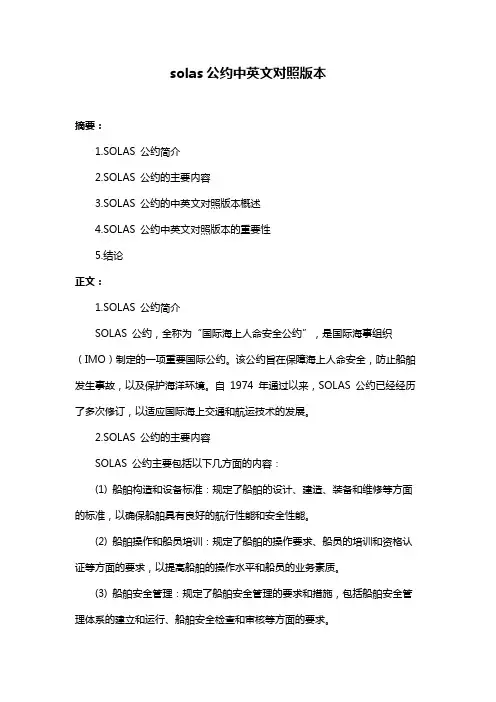
solas公约中英文对照版本摘要:1.SOLAS 公约简介2.SOLAS 公约的主要内容3.SOLAS 公约的中英文对照版本概述4.SOLAS 公约中英文对照版本的重要性5.结论正文:1.SOLAS 公约简介SOLAS 公约,全称为“国际海上人命安全公约”,是国际海事组织(IMO)制定的一项重要国际公约。
该公约旨在保障海上人命安全,防止船舶发生事故,以及保护海洋环境。
自1974 年通过以来,SOLAS 公约已经经历了多次修订,以适应国际海上交通和航运技术的发展。
2.SOLAS 公约的主要内容SOLAS 公约主要包括以下几方面的内容:(1) 船舶构造和设备标准:规定了船舶的设计、建造、装备和维修等方面的标准,以确保船舶具有良好的航行性能和安全性能。
(2) 船舶操作和船员培训:规定了船舶的操作要求、船员的培训和资格认证等方面的要求,以提高船舶的操作水平和船员的业务素质。
(3) 船舶安全管理:规定了船舶安全管理的要求和措施,包括船舶安全管理体系的建立和运行、船舶安全检查和审核等方面的要求。
(4) 应急响应和事故调查:规定了船舶在发生紧急情况或事故时应采取的措施,以及事故调查和处理等方面的要求。
3.SOLAS 公约的中英文对照版本概述SOLAS 公约中英文对照版本是将SOLAS 公约的英文原文与中文译文进行对照排版,以便于国内外相关机构和人员更好地了解和执行公约的规定。
中英文对照版本不仅有利于提高公约的执行力,还有助于加强国际间的海事合作和交流。
4.SOLAS 公约中英文对照版本的重要性SOLAS 公约中英文对照版本具有以下重要意义:(1) 提高公约的执行力:中英文对照版本便于国内外相关机构和人员了解公约的规定,有利于公约的执行和落实。
(2) 促进国际海事合作:中英文对照版本有助于加强国际间的海事合作和交流,提高国际海事组织的影响力。
(3) 保障海上人命安全:通过中英文对照版本,可以更好地宣传和普及公约的规定,提高船舶的安全性能和船员的业务素质,从而保障海上人命安全。
solas公约2016综合文本SOLAS公约(Safety of Life at Sea Convention)是国际海事组织(IMO)制定的一项重要国际公约,旨在确保海上航行的安全。
SOLAS公约的2016综合文本是对早期版本的更新和修订,旨在适应当今海上交通的新发展。
本文将对SOLAS公约2016综合文本进行解读,以便更好地理解和应用这一重要的国际法规。
一、SOLAS公约的背景及重要性SOLAS公约的诞生源于对海上航行安全的关切。
作为保护全球海上航行人员、载货船只和环境的重要举措,SOLAS公约对保证海上航行的顺利进行具有重要的意义。
公约内容全面,涵盖了船舶建造、设施设备、船员培训、航行和通信等多个方面,为确保海上船舶的安全提供了坚实的基础。
二、SOLAS公约2016综合文本的主要内容SOLAS公约2016综合文本对早期版本的条文进行了细化和更新。
其中,对于船舶的建造和设备要求进行了增加和调整,以适应科技和工程等方面的新发展。
此外,在航行和通信方面也有着新的要求,以确保船舶能够及时、准确地与陆地进行通讯。
三、SOLAS公约2016综合文本的适用范围SOLAS公约适用于所有载货船只,无论船舶的类型和大小。
公约规定了船舶在建造和运营过程中需要满足的标准和要求,以确保船舶及其人员的安全。
此外,公约还规定了船舶国家安全监管机构的职责和义务,以保证公约的有效实施。
四、SOLAS公约2016综合文本的发展趋势随着科技的飞速发展和全球海上航行的不断增加,SOLAS公约2016综合文本也在不断更新和修订中。
近年来,公约对新兴技术的应用给予了更多的关注,如自动化技术和无人船舶的使用。
同时,公约也在加强对船舶环境保护的要求,在减少碳排放和防止海上污染等方面提出了新的要求。
五、SOLAS公约2016综合文本对国际海事行业的影响SOLAS公约2016综合文本对国际海事行业的影响不可低估。
公约的实施促进了船舶和船员的安全,提高了航行效率,并为国际贸易和邮轮旅游等领域的发展提供了有力支持。
国际海事公约卫星组织(国际海事卫星)本公约的缔约国:考虑到联合国大会第1721 (XVI)号决议规定的原则,即应在全球和不歧视的基础上尽快向世界各国提供卫星通讯,考虑到原则条约的有关规定的活动状态在探索和利用外空,包括月球和其他天体,总结1967年1月27日,特别是第一条,即外层空间应使用的效益和所有国家的利益,考虑到世界贸易很大一部分依赖于船舶,意识到可以利用卫星对海上遇险和安全系统、船舶之间、船舶与其管理之间以及船上船员或乘客与岸上人员之间的通信联系进行重大改进。
为此目的,决心通过现有最先进的适当空间技术,为所有国家的船舶提供符合最有效和公平利用无线电频谱和卫星轨道的最有效和最经济的可能设施。
认识到海事卫星系统包括移动地面站和陆地地面站以及空间部分。
同意如下:“1定义为本公约的目的:(一)“业务协定”系指《国际海事卫星组织业务协定》,包括其附件。
(b)“缔约国”是指本公约对其生效的国家。
(c)“签署人”系指根据第2(31)条指定的一方或实体,经营协议已对其生效。
(d)“空间部分”指的是卫星,跟踪,遥测。
命令。
支持这些卫星运作所需的控制、监测及有关设施和设备。
(e)“国际海事卫星组织空间段”是指国际海事卫星组织拥有或租用的空间段。
(f)“船舶”是指在海洋环境中作业的海船。
它包括水翼船、气垫船、潜水器、浮船和非永久系泊的平台。
(g)“财产”是指任何可以成为所有权主体的东西,包括合同权利。
第二条建立海事卫星组织(一)成立国际海事卫星组织(简称NMARSAT),以下简称“本组织”。
(二)经营协定应按照本公约的规定订立,并应与本公约同时开放供签署。
(3)各方应签署经营协议或自行指定主管实体。
公共的或私人的,受该方管辖的,应签署经营协议。
(4)电信管理部门和实体可能适用的国内法,谈判和直接输入到适当的流量协议对电信设备的使用提供了根据本公约和操作协议,以及对服务提供给公众,设施、收入分配及相关业务安排。
国际海事组织公约(一)1948年国际海事组织公约CONVENTION ON THE INTERNA TIONAL MARITIME ORGANIZA TION,1948颁布日期:19480306 实施日期:19580317 颁布单位:日内瓦The States parties to the present Convention hereby establish theInternational Maritime Organization (hereinafter referred to as theOrganization )。
PART I Purposes of the OrganizationArticle 1The purposes of the Organization are:(a)To provide machinery for co-operation among Governments in thefield of governmental regulation and practices relating to technicalmatters of all kinds affecting shipping engaged in international trade;toencourage and facilitate the general adoption of the highest practicablestandards in matters concerning the maritime safety,efficiency ofnavigation and prevention and control of marine pollution from ships;andto deal with administrative and legal matters related to the purposes setout in this Article;(b)To encourage the removal of discriminatory action andunnecessaryrestrictions by Governments affecting shipping engaged in internationaltrade so as to promote the availability of shipping services to thecommerce of the world without discrimination;assistance and encouragementgiven by a Government for the development of its national shipping and forpurposes of security does not in itself constitute discrimination,provided that such assistance and encouragement is not based on measuresdesigned to restrict the freedom of shipping of all flags to take part ininternational trade;(c)To provide for the consideration by the Organization of mattersconcerning unfair restrictive practices by shipping concerns in accordancewith Part II;(d)To provide for the consideration by the Organization of anymatters concerning shipping and the effect of shipping on the marineenvironment that may be referred to it by any organ or specialized agencyof the United Nations;(e)To provide for the exchange of information among Governments onmatters under consideration by the Organization.PART II FunctionsArticle 2In order to achieve the purposes set out in Part I,the Organizationshall:(a)Subject to the provisions of Article 3,consider andmakerecommendations upon matters arising under Article 1 (a),(b)and (c)thatmay be remitted to it by Members,by any organ or specialized agency ofthe United Nations or by any other intergovernmental organization or uponmatters referred to it under Article 1 (d);(b)Provide for the drafting of conventions,agreements,or othersuitable instruments,and recommend these to Governments and tointergovernmental organizations,and convene such conferences as may benecessary;(c)Provide machinery for consultation among Members and the exchangeof information among Governments;(d)Perform functions arising in connexion with paragraphs (a),(b)and (c)of this Article,in particular those assigned to it by or underinternational instruments relating to maritime matters and the effect ofshipping on the marine environment;(e)Facilitate as necessary,and in accordance with Part X,technicalco-operation within the scope of the Organization.Article 3In those matters which appear to the Organization capable ofsettlement through the normal processes of international shipping businessthe Organization shall so recommend. When,in the opinion of theOrganization,any matter concerning unfair restrictive practicesbyshipping concerns is incapable of settlement through the normal processesof international shipping business,or has in fact so proved,and providedit shall first have been the subject of direct negotiations between theMembers concerned,the Organization shall,at the request of one of thoseMembers,consider the matter.PART III MembershipArticle 4Membership in the Organization shall be open to all States,subject tothe provisions of Part III.Article 5Members of the United Nations may become Members of the Organizationby becoming parties to the Convention in accordance with the provisions ofArticle 71.Article 6States not Members of the United Nations which have been invited tosend representatives to the United Nations Maritime Conference convened inGeneva on 19 February 1948,may become Members by becoming parties to theConvention in accordance with the provisions of Article 71.Article 7Any State not entitled to become a Member under Article 5 or 6 mayapply through the Secretary-General of the Organization to become aMemberand shall be admitted as a Member upon its becoming a party to theConvention in accordance with the provisions of Article 71 provided that,upon the recommendation of the Council,its application has been approvedby two-thirds of the Members other than Associate Members.Article 8Any Territory or group of Territories to which the Convention has beenmade applicable under Article 72,by the Member having responsibility forits international relations or by the United Nations,may become anAssociate Member of the Organization by notification in writing given bysuch Member or by the United Nations,as the case may be,to the SecretaryGeneral of the United Nations.Article 9An Associate Member shall have the rights and obligations of a Memberunder the Convention except that it shall not have the right to vote or beeligible for membership on the Council and subject to this the word Member in the Convention shall be deemed to include Associate Memberunless the context otherwise requires.Article 10No State or Territory may become or remain a Member of theOrganization contrary to a resolution of the General Assembly of theUnited Nations.PART IV OrgansArticle 11The Organization shall consist of an Assembly, a Council, a MaritimeSafety Committee, a Legal Committee, a Marine Environment ProtectionCommittee, a Technical Co-operation Committee and such subsidiary organsas the Organization may at any time consider necessary;and aSecretariat.PART V The AssemblyArticle 12The Assembly shall consist of all the Members.Article 13Regular sessions of the Assembly shall take place once every twoyears. Extraordinary sessions shall be convened after a notice of sixtydays whenever one-third of the Members give notice to theSecretary-General that they desire a session to be arranged,or at anytime if deemed necessary by the Council,after a notice of sixty days.Article 14A majority of the Members other than Associate Members shallconstitute a quorum for the meetings of the Assembly.Article 15The functions of the Assembly shall be:(a)To elect at each regular session from among its Members,otherthan Associate Members,its President and two Vice-Presidents who shallhold office until the next regular session;(b)To determine its own Rules of Procedure except as otherwiseprovided in the Convention;(c)To establish any temporary or,upon recommendation of the Council,permanent subsidiary bodies it may consider to be necessary;(d)To elect the Members to be represented on the Council as providedin Article 17;(e)To receive and consider the reports of the Council,and to decideupon any question referred to it by the Council;(f)To approve the work programme of the Organization;(g)To vote the budget and determine the financial arrangements of theOrganization,in accordance with Part XII;(h)To review the expenditures and approve the accounts of theOrganization;(i)To perform the functions of the Organization,provided that inmatters relating to Article 2 (a)and (b),the Assembly shall refer suchmatters to the Council for formulation by it of any recommendations orinstruments thereon;provided further that any recommendations orinstruments submitted to the Assembly by the Council and not accepted bythe Assembly shall be referred back to the Council for furtherconsideration with such observations as the Assembly may make;(j)To recommend to Members for adoption regulations and guidelinesconcerning maritime safety,the prevention and control ofmarine pollutionfrom ships and other matters concerning the effect of shipping on themarine environment assigned to the Organization by or under internationalinstruments,or amendments to such regulations and guidelines which havebeen referred to it;(k)To take such action as it may deem appropriate to promotetechnical co-operation in accordance with Article 2 (e),taking intoaccount the special needs of developing countries;(l)To take decisions in regard to convening any internationalconference or following any other appropriate procedure for the adoptionof international conventions or of amendments to any internationalconventions which have been developed by the Maritime Safety Committee,the Legal Committee,the Marine Environment Protection Committee,theTechnical Co-operation Committee,or other organs of the Organization.(m)To refer to the Council for consideration or decision any matterswithin the scope of the Organization,except that the function of makingrecommendations under paragraph (j)of this Article shall not bedelegated.PART VI The CouncilArticle 16The Council shall be composed of thirty-two Members elected by theAssembly.Article 17In electing the Members of the Council,the Assembly shall observe thefollowing criteria:(a)Eight shall be States with the largest interest in providinginternational shipping services;(b)Eight shall be other States with the largest interest ininternational seaborne trade;(c)Sixteen shall be States not elected under (a)or (b)above whichhave special interests in maritime transport or navigation,and whoseelection to the Council will ensure the representation of all majorgeographic areas of the world.Article 18Members represented on the Council in accordance with Article 16 shallhold office until the end of the next regular session of the Assembly.Members shall be eligible for re-election.Article 19(a)The Council shall elect its Chairman and adopt its own Rules ofProcedure except as otherwise provided in the Convention.(b)Twenty-one Members of the Council shall constitute a quorum. (c)The Council shall me et upon one month’s notice as often as may benecessary for the efficient discharge of its duties upon the summons ofits Chairman or upon request by not less than four of its Members.Itshall meet at such places as may be convenient.Article 20The Council shall invite any Member to participate,without vote,inits deliberations on any matter of particular concern to that Member.Article 21(a)The Council shall consider the draft work programme and budgetestimates prepared by the Secretary-General in the light of the proposalsof the Maritime Safety Committee,the Legal Committee,the MarineEnvironment Protection Committee,the Technical Co-operation Committee andother organs of the Organization and,taking these into account,shallestablish and submit to the Assembly the work programme and budget of theOrganization,having regard to the general interest and priorities of theOrganization.(b)The Council shall receive the reports,proposals andrecommendations of the Maritime Safety Committee,the Legal Committee,theMarine Environment Protection Committee,the Technical Co-operationCommittee and other organs of the Organization and shall transmit them tothe Assembly and,when the Assembly is not in session,to the Members forinformation,together with the comments and recommendations of theCouncil.(c)Matters within the scope of Articles 28,33,38 and 43 shall beconsidered by the Council only after obtaining the views of theMaritimeSafety Committee,the Legal Committee,the Marine Environment ProtectionCommittee,or the Technical Co-operation Committee,as may beappropriate.Article 22The Council,with the approval of the Assembly,shall appoint theSecretary-General. The Council shall also make provision for theappointment of such other personnel as may be necessary,and determine theterms and conditions of service of the Secretary-General and otherpersonnel,which terms and conditions shall conform as far as possiblewith those of the United Nations and its specialized agencies.Article 23The Council shall make a report to the Assembly at each regularsession on the work performed by the Organization since the previousregular session of the Assembly.Article 24The Council shall submit to the Assembly financial statements of theOrganization,together with the Council’s comments and recommendations.Article 25(a)The Council may enter into agreements or arrangements covering therelationship of the Organization with other organizations,as provided forin Part XV. Such agreements or arrangements shall be subject toapprovalby the Assembly.(b)Having regard to the provisions of Part XV and to the relationsmaintained with other bodies by the respective Committees under Articles28,33,38 and 43,the Council shall,between sessions of the Assembly,beresponsible for relations with other organizations. Article 26Between sessions of the Assembly,the Council shall perform all thefunctions of the Organization,except the function of makingrecommendations under Article 15 (j)。